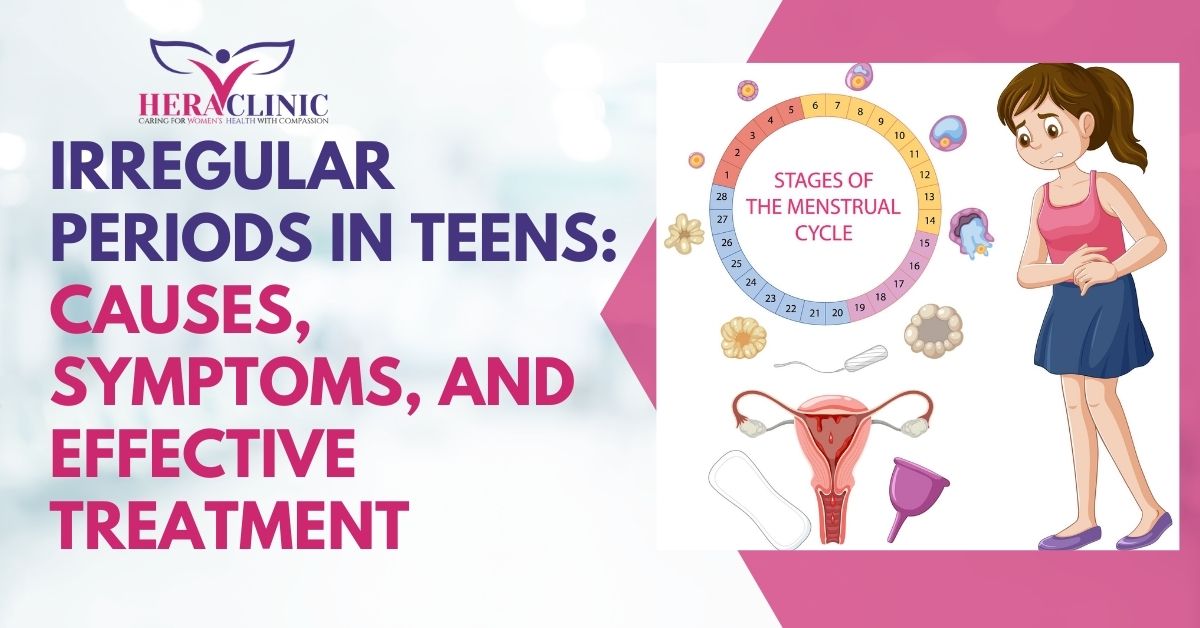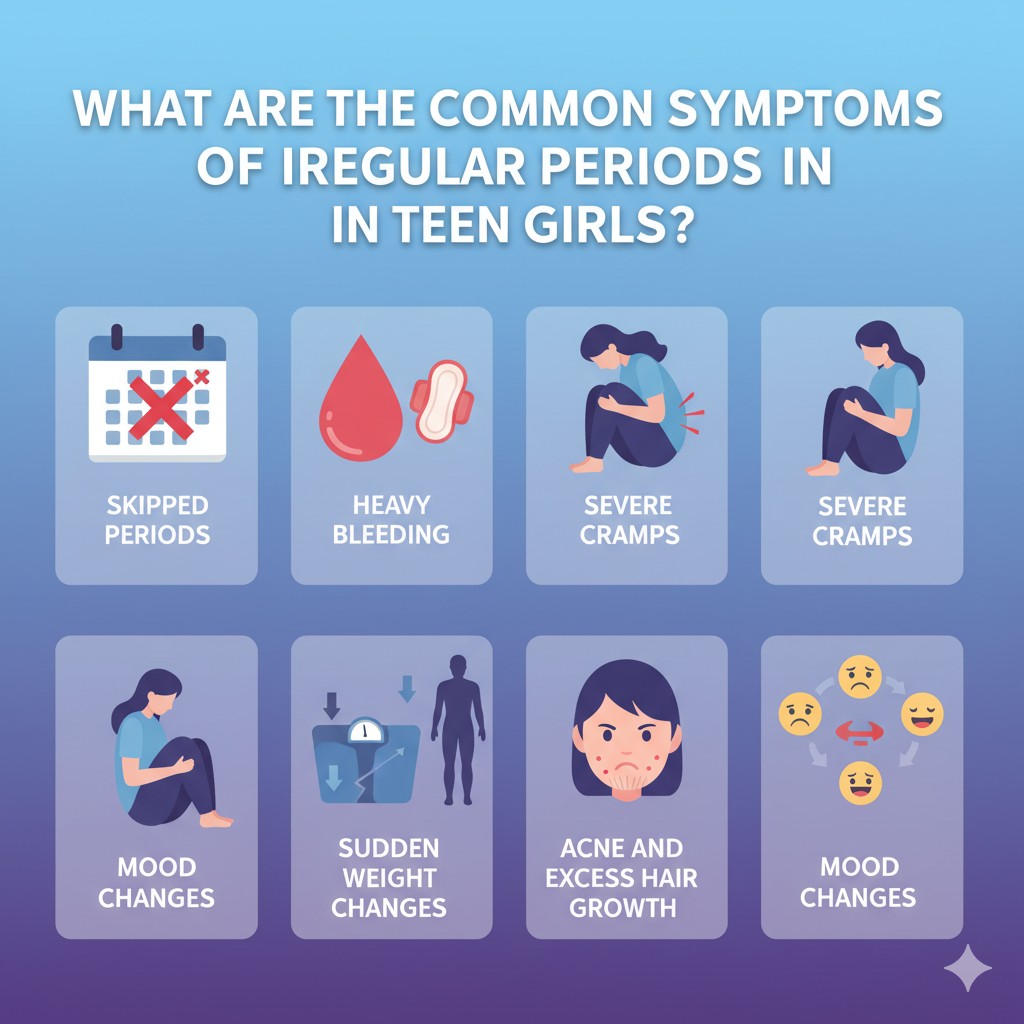
Irregular Periods in Teens: Causes, Symptoms, and Effective Treatment
Menstruation is a significant milestone in a teenage girl’s life. It signals the onset of reproductive maturity, but for many teens, irregular periods can be confusing and concerning. From skipped cycles to unpredictable bleeding, these irregularities can affect physical health, emotional well-being, and daily life.
At Hera Clinic, under the guidance of Dr. Sairandhri Kate, we focus on adolescent gynecology and menstrual health. Our goal is to help teens and parents understand the causes of irregular periods in teens, recognize symptoms, and explore safe and effective management options.
What Are Irregular Periods?
Irregular periods are menstrual cycles that vary in length, intensity, or duration. While some variability is normal, especially in the first few years after menarche (first period), persistent irregularity may indicate underlying health issues.
Understanding a Normal Menstrual Cycle
- The average menstrual cycle ranges from 21–35 days.
- Bleeding typically lasts 3–7 days.
- Minor variations month-to-month are normal, but cycles that are consistently irregular may require attention.
Why Irregular Periods Happen in Teens?
Teen bodies are still learning to regulate hormones such as estrogen and progesterone. These fluctuations can cause cycles that are shorter, longer, or unpredictable.
Expert Insight:According to Dr. Sairandhri Kate at Hera clinic, up to 75% of adolescent girls experience irregular cycles within the first 2–3 years after their first period. While this is often normal, monitoring menstrual health helps detect potential concerns early
What Are the Common Symptoms of Irregular Periods in Teen Girls?

Skipped Meals
Teens may miss menstrual cycles for several months, which could indicate hormonal imbalances, delayed ovulation, or conditions like PCOS. Tracking missed periods helps parents and healthcare providers identify underlying issues and provide early guidance for proper treatment.
Heavy Bleeding
Experiencing very heavy bleeding, soaking multiple pads or tampons per hour, or passing large clots may signal hormonal imbalances, uterine issues, or other reproductive health concerns. Persistent heavy bleeding should be evaluated by a healthcare professional to prevent anemia and maintain overall health.
Severe Cramps
Intense abdominal or pelvic pain during periods that interferes with school, sports, or daily activities may indicate endometriosis, PCOS, or other menstrual disorders. Teens experiencing severe cramps should consult a specialist like Dr. Sairandhri Kate for proper diagnosis and treatment.
Sudden Weight Changes
Rapid weight gain or loss can significantly affect hormonal balance, leading to irregular menstrual cycles. Maintaining a healthy lifestyle with balanced nutrition and moderate exercise can help stabilize cycles, but persistent changes should be evaluated by a healthcare provider.
Acne And Excess Hair Growth
Persistent acne, facial hair, or unusual body hair growth in teens can be linked to hormonal imbalances, particularly PCOS. Early evaluation and guidance from specialists like Dr. Sairandhri Kate can help manage symptoms and prevent long-term complications.
Mood Changes
Irritability, fatigue, anxiety, or emotional swings may result from hormonal fluctuations impacting teen mental health. Tracking moods alongside menstrual cycles helps identify patterns and ensures timely intervention when symptoms interfere with daily life or emotional well-being.
What Causes Irregular Periods in Teens?
1. Hormonal Changes During Puberty
The teenage years involve rapid hormonal changes as the body transitions into reproductive maturity. This natural process can lead to cycles that are shorter, longer, or inconsistent.
2. Polycystic Ovary Syndrome (PCOS)
PCOS is one of the most common causes of irregular periods in teens. It can cause:
- Irregular or missed periods
- Excessive Hair Growth
- Acne And Oily Skin
- Weight Gain
Early diagnosis and management at Hera Clinic can prevent long-term complications like fertility issues and metabolic problems.
3. Stress And Lifestyle Factor
Emotional stress, academic pressure, poor sleep, and extreme exercise can all affect hormonal balance. Teens experiencing high stress may notice skipped or irregular periods.
4. Thyroid Disorders
Emotional stress, academic pressure, poor sleep, and extreme exercise can all affect hormonal balance. Teens experiencing high stress may notice skipped or irregular periods.
5. Other Health Conditions
Chronic illnesses, eating disorders, and certain medications, including hormonal contraceptives or steroids, may affect menstrual regularity
Hera Clinic Advice: Monitoring symptoms and cycles helps parents and teens identify patterns and triggers, allowing for timely intervention with guidance from Dr. Sairandhri Kate
How to Manage Irregular Periods in Teens
Managing irregular periods often involves a combination of lifestyle changes, medical treatments, and supportive home practices.
1. Lifestyle Changes
- Balanced Diet: Include iron-rich foods, fresh fruits, vegetables, whole grains, and lean proteins. Avoid excessive sugar and processed foods.
- Regular Exercise: Helps maintain a healthy weight and supports hormonal balance. Moderate exercise is recommended; extreme workouts may worsen irregularity.
- Stress Management: Mindfulness practices, yoga, and adequate sleep reduce stress-related hormonal disruptions.
2. Tracking Menstrual Cycle
Apps And Calenders Help Track :
- Start and end dates of periods
- Start and end dates of periods
- Symptoms like cramps, mood changes, or acne Tracking provides valuable insights for consultations with Dr. Sairandhri Kate and supports personalized treatment plans.
3. Medical Treatments
- Hormonal therapy, if required, can regulate cycles.
- Treatment for PCOS, thyroid issues, or other underlying conditions may restore regularity. For families searching for Irregular Periods Treatment in Punawale PCMC, Hera clinic offers expert evaluation and customized care plans for teens.
4. Home Remedies
- Warm compresses, herbal teas, or gentle stretching can relieve cramps.
- Proper hydration and sleep improve hormonal balance and support overall menstrual health.
Expert Tip: While home remedies are helpful for mild symptoms, persistent irregularity should always be evaluated professionally.
When to Consult a Healthcare Provider
Parents should seek medical guidance if a teen experiences:
- Missing periods for more than three months
- Very heavy or prolonged bleeding
- Severe pelvic pain affecting daily life
- Signs of PCOS or hormonal imbalance
At Hera Clinic, Dr. Sairandhri Kate specializes in adolescent gynecology, providing diagnosis, treatment, and ongoing support for menstrual health in teens. Early intervention prevents complications and helps teens maintain better physical and emotional health.
What Are Irregular Periods?
Irregular periods are menstrual cycles that vary in length, intensity, or duration. While some variability is normal, especially in the first few years after menarche (first period), persistent irregularity may indicate underlying health issues.
Understanding a Normal Menstrual Cycle
- The average menstrual cycle ranges from 21–35 days.
- Bleeding typically lasts 3–7 days.
- Minor variations month-to-month are normal, but cycles that are consistently irregular may require attention.
Why Irregular Periods Happen in Teens
Teen bodies are still learning to regulate hormones such as estrogen and progesterone. These fluctuations can cause cycles that are shorter, longer, or unpredictable.
Expert Insight: According to Dr. Sairandhri Kate at Hera Clinic, up to 75% of adolescent girls experience irregular cycles within the first 2–3 years after their first period. While this is often normal, monitoring menstrual health helps detect potential concerns early.
When to Consult a Healthcare Provider
Parents should seek medical guidance if a teen experiences:
- Missing periods for more than three months
- Very heavy or prolonged bleeding
- Severe pelvic pain affecting daily life
- Signs of PCOS or hormonal imbalance
At Hera Clinic, Dr. Sairandhri Kate specializes in adolescent gynecology, providing diagnosis, treatment, and ongoing support for menstrual health in teens. Early intervention prevents complications and helps teens maintain better physical and emotional health.
Long-Term Health Considerations
Persistent irregular periods may lead to:
- Fertility Issues: Conditions like PCOS can affect reproductive health later.
- Metabolic Concerns: Irregular cycles may increase the risk of obesity, insulin resistance, and diabetes.
- Emotional Well-being: Chronic menstrual issues can affect confidence, school performance, and social life.
Proper guidance from experts like Dr. Sairandhri Kate teens receive care tailored to their needs, reducing long-term risks and supporting overall well-being.
Tips for Parents Supporting Teens with Irregular Periods
- Open Communication: Create a safe space for teens to discuss menstrual issues without embarrassment.
- Track Symptoms Together:Encourage your teen to maintain a menstrual diary.
- Promote Healthy Habits: Support balanced diet, exercise, and stress management.
- Seek Professional Help When Needed:Regular checkups ensures early detection and treatment.
Expert Advice on Teen Menstrual Health
Irregular periods in teens are common, but persistent or severe symptoms should not be ignored. Understanding the causes, recognizing symptoms, and seeking care from experts like Dr. Sairandhri Kate at Hera Clinic can help teens manage their menstrual health effectively.
With professional guidance, lifestyle adjustments, and proper monitoring, teens can experience healthier, more predictable cycles, reducing stress and improving overall well-being.
If your teen is experiencing irregular periods or other menstrual concerns, schedule a consultation with Dr. Sairandhri Kate today for personalized care and guidance.
Frequently Asked Question :
Q1: Can irregular periods affect fertility later?
A: Persistent irregular periods may indicate conditions like PCOS or hormonal imbalance. Early evaluation by specialists like Dr. Sairandhri Kate ensures proper management, reducing potential fertility issues later in life.
Q2: How long do irregular periods last in teens?
A: Irregular periods often occur during the first 2–3 years after menarche. Persistent irregularity beyond this timeframe should be evaluated by a healthcare provider for proper diagnosis and treatment.
Q3: Are irregular periods normal during puberty?
A: Yes, minor irregularities are common during puberty as hormone levels stabilize. Tracking cycles helps identify patterns and signals when professional guidance from Dr. Sairandhri Kate is needed.
Q4: Can lifestyle changes help regulate periods?
A: Healthy diet, regular exercise, stress management, and proper sleep support hormonal balance, helping regulate cycles. Lifestyle improvements often complement medical treatment for irregular periods in teens.
Q5: How can parents support teens with irregular periods?
A: Encourage open communication, maintain a menstrual diary, promote healthy habits, and consult healthcare providers like Dr. Sairandhri Kate to ensure early intervention and proper management.
